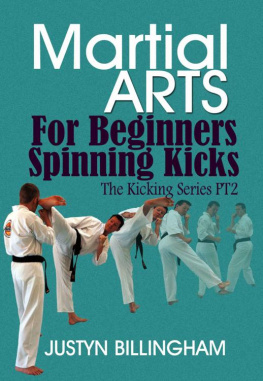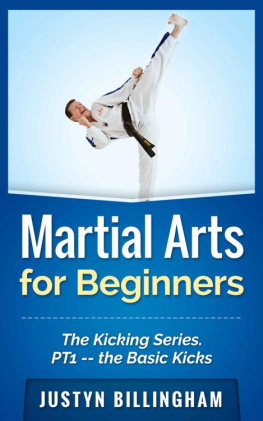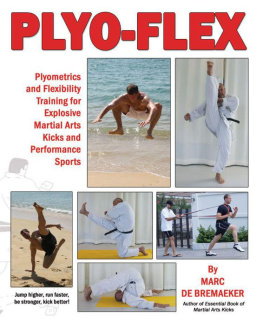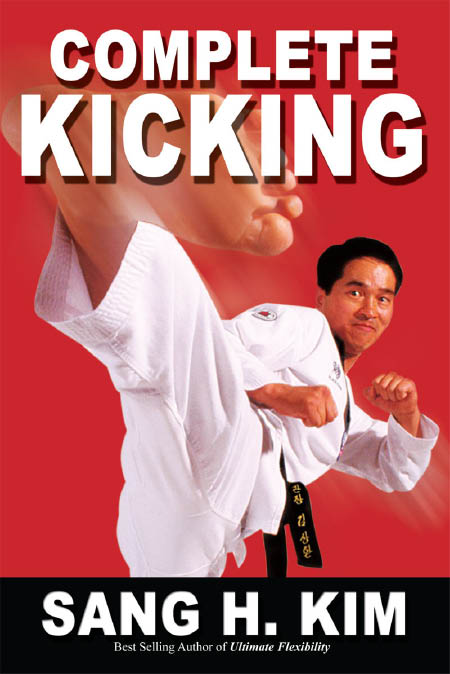Complete Kicking
The Ultimate Guide to Kicks for Martial Arts Self-defense & Combat Sports
Sang H. Kim, Ph.D.
COMPLETE KICKING
A Turtle Press Book / 2009
Copyright 2009 Sang H. Kim. All Rights Reserved.
Printed in the United States of America. No part of this book may be reproduced without written permission except in the case of brief quotations embodied in articles or reviews. For information, address Turtle Press, PO Box 34010, Santa Fe, NM 87594-0410
Photographer: Marc Regis, Cynthia A. Kim
Photo models: Sang H. Kim, Kyu-hyung Lee, Carlos Sanchez, Marco Corea
ISBN 9781934903742
Warning-Disclaimer
This book is designed to provide information on specific skills used in martial arts and fitness training. It is not the purpose of this book to reprint all the information that is otherwise available to the author, publisher, printer or distributors, but instead to complement, amplify and supplement other texts. You are urged to read all available material, learn as much as you wish about the subjects covered in this book and tailor the information to your individual needs. Anyone practicing the skills presented in this book should be physically capable to do so and have the permission of a licensed physician before participating in this activity or any physical activity.
Every effort has been made to make this book as complete and accurate as possible. However, there may be mistakes, both typographical and in content. Therefore, this text should be used only as a general guide and not the ultimate source of information on the subjects presented here in this book on any skill or subject. The purpose of this book is to provide information and entertain. The author, publisher, printer and distributors shall neither have liability nor responsibility to any person or entity with respect to loss or damages caused, or alleged to have been caused, directly or indirectly, by the information contained in this book.
INTRODUCTION
Kicking is for every fighter. Its powerful, fast, and deadly. Regardless of martial art style, the fundamentals are much the same: kick fast, kick hard, kick precisely. To meet these goals, you need to train your body, strengthen your muscles, and condition your mind.
Youll be surprised to find initially how natural kicking is, just like walking and running. However, to excel at kicking, you have to go beyond what is natural. You must learn to control your body at all times in order to acquire precision, speed and power. Then your body will become a deadly weapon for self-protection and an invincible tool for sport competition.
After you perfect the basic skills, you are only a few steps away from mastering challenging advanced kicks. As you progress and learn increasingly difficult kicks, you will find that practicing kicking enhances your mental clarity and concentration, as well as your physical fitness.
Preparation
If youre reading this book, you obviously have a serious interest in improving your kicking skills. You might already be a martial arts student or you might be thinking of taking up a martial art. Either way, here are some key things to know before you get started:
find a place
Kicking can be practiced almost anywhere that has a flat surface clear of obstacles. You can practice on your own, but if you are novice, professional instruction at a martial art school or program is recommended. To choose a class, visit the school(s) you are interested in and see for yourself: Is the instructor professional and knowledgeable? Do you feel like learning from him or her? Do the students have the right attitude? Check out the condition of the facility - is it clean and safe? Ask students what they like and dont like about the class. Once youre settled, either in a class or at home, develop a regular training schedule to achieve your goals.
proper outfit
Kicking requires free range of movement, so your training outfit should be loose fitting, especially in the hips and knees. Loose fitting shorts, sweat pants or a martial art uniform are safe, comfortable options.
equipment
In the beginning stage of learning a kick, you may need something to assist with your balance and posture, such as a stretching bar, chair, or even a wall. Once youve mastered the basic method of kicking, youll use a target to improve your precision. Commonly used targets are a speed-bag hung from the ceiling, a free standing reflex bag, a double end ball or a hand target held by a partner. For power and speed practice, youll use a heavy bag.
safety
Before practicing a new kick, learn the movement and visualize it. Know your physical limits and build from where you are. Gradually increase the height, speed, power and complexity of your movements. It is also very important to warm up for 10 to 15 minutes prior to practice and to cool down for about 5 minutes afterward to prevent injuries.
A First Lesson
fighting stance
Your stance is the position of your feet and hands. To make a basic fighting stance:
1. Place your feet about shoulder width apart with your weak side foot in front and your strong side foot in the rear. (If youre right handed, your right foot is your strong side.) For power, widen your stance. For speed and mobility, narrow your stance.
2. Turn your front foot inward 15 to 30 and turn your rear foot outward 60 to 90. Keep your weight slightly more on the balls of your feet.
3. Bend your knees slightly.
4. Keep your torso upright and angled away from your opponent to protect your vital targets. Tuck your chin down slightly toward your chest and look at the target.
5. Bend your elbows and bring your hands in front of your chest to protect your torso and face.
6. Relax your shoulders and move rhythmically.
Foot position determines your kicking capacity and controls your center.
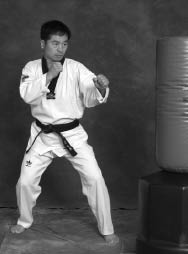
balance
Your knee and head positions are critical for maintaining your balance. Keep your head level and look at the target. Keep your knees slightly flexed to lower your center of gravity. When you kick, your standing knee should remain slightly flexed to maintain your balance in motion.
control
Kicking requires you to have two contradictory attributes: control and freedom of movement. You need to control your body to execute a kick precisely. However, constant controlling, and the consciousness of it, makes your body stiff. Through practice, you will develop muscle memory so that eventually your body will perform the kick without conscious thought. Muscle memory allows you to focus on suppleness without controlling the moving parts of each kick.
practice
Dont be afraid to experiment with changes that might improve your performance. Vary your practice routine so it is mentally and physically engaging, not routine or boring. When you become good at in-place kicking, add footwork and drills or vary the speed, power and height.
feedback
When you run into trouble with a kick, listen to your body and go back to basics. Everyones body is shaped and functions differently, so you might need to adapt the instructions in this book to fit your own body type. Problems are often the foundation for enhanced performance, so dont get discouraged. Stay positive and experiment.
revision
There are many levels of mastery and your perception of perfection fluctuates because your kicking changes according to your condition, opponent, and circumstances. In training, youll find that you have to constantly revisit a time when a kick felt right for you and try to recapture that feeling and build on it.





